(完整word版)人教版重庆中考英语高频考点复习
[全]中考英语高频考点、句型详解-人教版
![[全]中考英语高频考点、句型详解-人教版](https://img.taocdn.com/s3/m/410328f7e518964bce847c9e.png)
中考英语高频考点、句型详解-人教版主题句:He accepted her invitation to the party.他接受了她的去参加聚会的邀请。
考点一、accept 和receive的用法辨析1.accept 用作动词,意为"接受",指经过考虑而主动"接受",强调个人的主观意愿。
He is very glad to accept my invitation.他非常愉快地接受了我的邀请。
I'm afraid that I can't accept your presents.恐怕我不能接受你们的礼品。
2. receive 用作动词,意为"收到、接收",通常指收到某物的客观动作,含有被动意味,不强调主观态度(接受或拒绝)。
It is better to give than to receive.给予要比接受好.I received his expensive birthday gift, but I refused to accept it politely. 我收到他送的昂贵的生日礼物,但我礼貌地拒绝了。
He wants to receive a good education at university.他想要在大学接受良好的教育。
考点二、invitation 的用法1. invitation 名词,意为"邀请;请柬",是由动词invite 转变而来的名词。
Thanks for your invitation, but I have to stay at home to look after my baby sister.感谢你的邀请,但我必须待在家里照看我的小妹妹。
I'm afraid you can't come to our party without our invitation.没有我们的邀请,恐怕你不能参加我们的聚会。
2024届重庆市(康德卷)普通高等学校招生全国统一考试高考模拟调研卷(三)英语试题(高频考点)
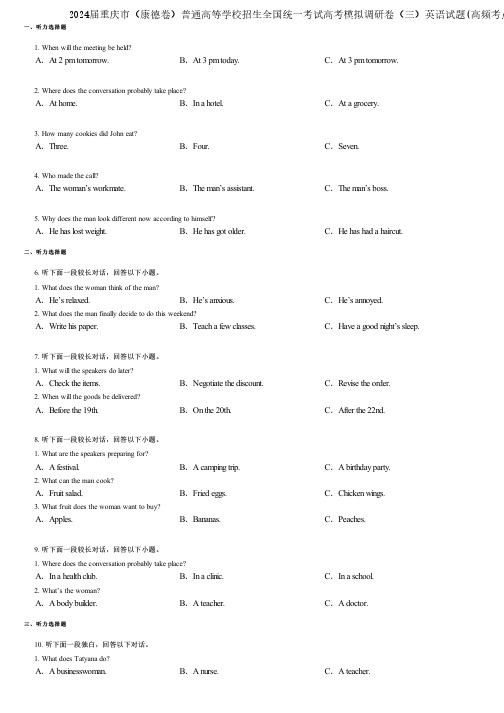
1. When will the meeting be held?A.At 2 pm tomorrow.B.At 3 pm today.C.At 3 pm tomorrow.2. Where does the conversation probably take place?A.At home.B.In a hotel.C.At a grocery.3. How many cookies did John eat?A.Three.B.Four.C.Seven.4. Who made the call?A.The woman’s workmate.B.The man’s assistant.C.The man’s boss.5. Why does the man look different now according to himself?A.He has lost weight.B.He has got older.C.He has had a haircut.二、听力选择题6. 听下面一段较长对话,回答以下小题。
1. What does the woman think of the man?A.He’s relaxed.B.He’s anxious.C.He’s annoyed.2. What does the man finally decide to do this weekend?A.Write his paper.B.Teach a few classes.C.Have a good night’s sleep.7. 听下面一段较长对话,回答以下小题。
1. What will the speakers do later?A.Check the items.B.Negotiate the discount.C.Revise the order.2. When will the goods be delivered?A.Before the 19th.B.On the 20th.C.After the 22nd.8. 听下面一段较长对话,回答以下小题。
中考英语高频考点复习有什么
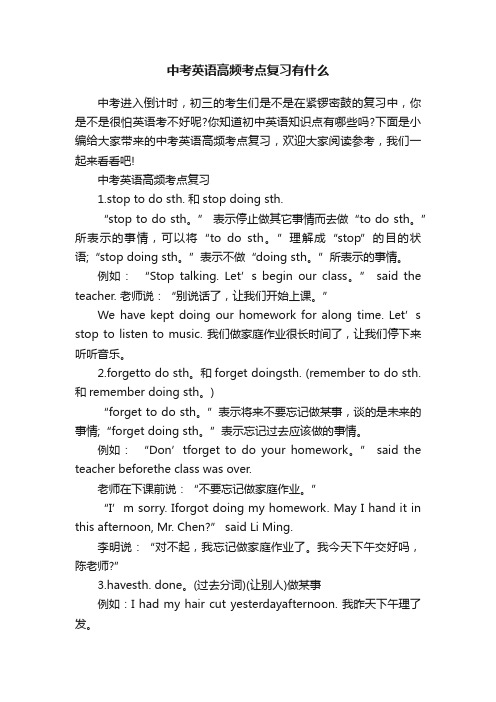
中考英语高频考点复习有什么中考进入倒计时,初三的考生们是不是在紧锣密鼓的复习中,你是不是很怕英语考不好呢?你知道初中英语知识点有哪些吗?下面是小编给大家带来的中考英语高频考点复习,欢迎大家阅读参考,我们一起来看看吧!中考英语高频考点复习1.stop to do sth. 和stop doing sth.“stop to do sth。
” 表示停止做其它事情而去做“to do sth。
”所表示的事情,可以将“to do sth。
”理解成“stop”的目的状语;“stop doing sth。
”表示不做“doing sth。
”所表示的事情。
例如:“Stop talking. Let’s begin our class。
” said the teacher. 老师说:“别说话了,让我们开始上课。
”We have kept doing our homework for along time. Let’s stop to listen to music. 我们做家庭作业很长时间了,让我们停下来听听音乐。
2.forgetto do sth。
和forget doingsth. (remember to do sth. 和remember doing sth。
)“forget to do sth。
”表示将来不要忘记做某事,谈的是未来的事情;“forget doing sth。
”表示忘记过去应该做的事情。
例如:“Don’tforget to do your homework。
” said the teacher beforethe class was over.老师在下课前说:“不要忘记做家庭作业。
”“I’m sorry. Iforgot doing my homework. May I hand it in this afternoon, Mr. Chen?” said Li Ming.李明说:“对不起,我忘记做家庭作业了。
(全)2021中考英语:高频考点+句型详细解析-人教版
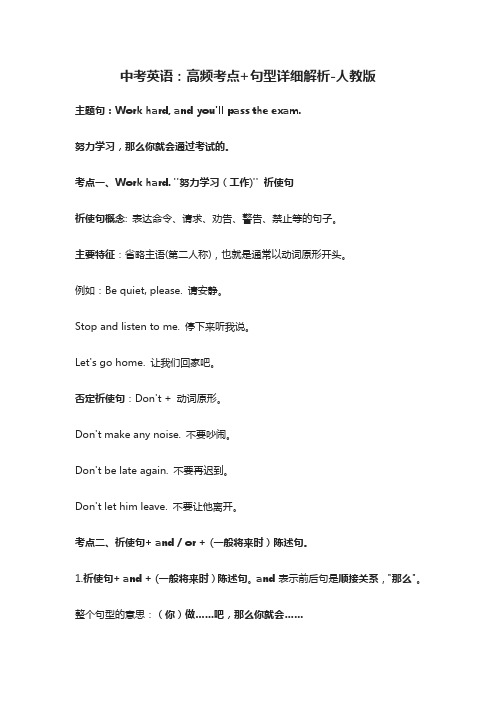
中考英语:高频考点+句型详细解析-人教版主题句:Work hard, and you'll pass the exam.努力学习,那么你就会通过考试的。
考点一、Work hard. "努力学习(工作)" 祈使句祈使句概念: 表达命令、请求、劝告、警告、禁止等的句子。
主要特征:省略主语(第二人称),也就是通常以动词原形开头。
例如:Be quiet, please. 请安静。
Stop and listen to me. 停下来听我说。
Let's go home. 让我们回家吧。
否定祈使句:Don't + 动词原形。
Don't make any noise. 不要吵闹。
Don't be late again. 不要再迟到。
Don't let him leave. 不要让他离开。
考点二、祈使句+ and / or + (一般将来时)陈述句。
1.祈使句+ and + (一般将来时)陈述句。
and表示前后句是顺接关系,"那么"。
整个句型的意思:(你)做……吧,那么你就会……Keep doing sports, and you'll get healthier. 坚持做运动,那么你就会身体好起来。
Get up early, and you'll catch the early bus. 早点起床,那么你就会赶上早班车。
2. 祈使句+ or + (一般将来时)陈述句。
or表示前后句是转折关系,"否则的话"整个句型的意思是:(你)做……吧,否则的话你就会……Work hard, or you won't pass the exam. 努力学习吧,否则你不会通过考试的。
Be careful, or you will make more mistakes. 仔细些,否则你会犯更多错误的。
2024初中英语中考阅读理解高频考点必刷专项练习卷 (5396)
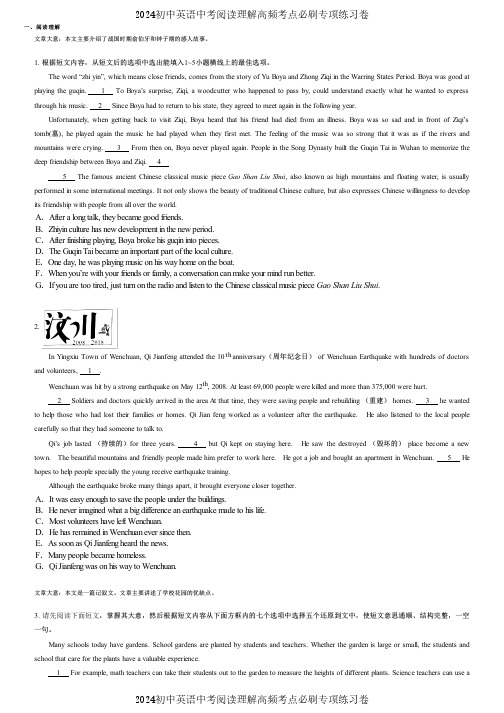
一、阅读理解文章大意:本文主要介绍了战国时期俞伯牙和钟子期的感人故事。
1. 根据短文内容,从短文后的选项中选出能填入1~5小题横线上的最佳选项。
The word “zhi yin”, which means close friends, comes from the story of Yu Boya and Zhong Ziqi in the Warring States Period. Boya was good at playing the guqin. 1 To Boya’s surprise, Ziqi, a woodcutter who happened to pass by, could understand exactly what he wanted to express through his music. 2 Since Boya had to return to his state, they agreed to meet again in the following year.Unfortunately, when getting back to visit Ziqi, Boya heard that his friend had died from an illness. Boya was so sad and in front of Ziqi’s tomb(墓), he played again the music he had played when they first met. The feeling of the music was so strong that it was as if the rivers and mountains were crying. 3 From then on, Boya never played again. People in the Song Dynasty built the Guqin Tai in Wuhan to memorize the deep friendship between Boya and Ziqi. 45 The famous ancient Chinese classical music piece Gao Shan Liu Shui, also known as high mountains and floating water, is usuallyperformed in some international meetings. It not only shows the beauty of traditional Chinese culture, but also expresses Chinese willingness to develop its friendship with people from all over the world.A.After a long talk, they became good friends.B.Zhiyin culture has new development in the new period.C.After finishing playing, Boya broke his guqin into pieces.D.The Guqin Tai became an important part of the local culture.E.One day, he was playing music on his way home on the boat.F.When you’re with your friends or family, a conversation can make your mind run better.G.If you are too tired, just turn on the radio and listen to the Chinese classical music piece Gao Shan Liu Shui.2.In Yingxiu Town of Wenchuan, Qi Jianfeng attended the 10th anniversary(周年纪念日) of Wenchuan Earthquake with hundreds of doctors and volunteers, 1 .Wenchuan was hit by a strong earthquake on May 12th, 2008. At least 69,000 people were killed and more than 375,000 were hurt.2 Soldiers and doctors quickly arrived in the area At that time, they were saving people and rebuilding (重建) homes.3 he wantedto help those who had lost their families or homes. Qi Jian feng worked as a volunteer after the earthquake. He also listened to the local people carefully so that they had someone to talk to.Qi’s job lasted (持续的)for three years. 4 but Qi kept on staying here. He saw the destroyed (毁坏的)place become a new town. The beautiful mountains and friendly people made him prefer to work here. He got a job and bought an apartment in Wenchuan. 5 He hopes to help people specially the young receive earthquake training.Although the earthquake broke many things apart, it brought everyone closer together.A.It was easy enough to save the people under the buildings.B.He never imagined what a big difference an earthquake made to his life.C.Most volunteers have left Wenchuan.D.He has remained in Wenchuan ever since then.E.As soon as Qi Jianfeng heard the news.F.Many people became homeless.G.Qi Jianfeng was on his way to Wenchuan.文章大意:本文是一篇记叙文。
[全]2021中考英语高频考点、句型讲练-人教
![[全]2021中考英语高频考点、句型讲练-人教](https://img.taocdn.com/s3/m/c760d9d50b4e767f5acfcef4.png)
2021中考英语高频考点、句型讲练人教版主题句:This new machine is different from the old one.这台新机器和旧的那台是不同的。
考点:one的几种特殊用法one 除了用作数词,表示数量"一"以外,还有几种特殊用法。
1. one 用作不定代词,单独使用泛指包括说话者在内的任何人、人们,其复数形式为ones, 所有格形式为one's, 反身代词为oneself。
One must follow these public rules.一个人必须遵守这些公共规则。
One should learn to get on well with others at any time.一个人无论什么时候都应该学会和他人友好相处。
2. one 和ones 与定冠词the 连用,可以指代具体的人或物。
The one in red over there is my friend.那边穿红衣服的人是我的朋友。
I don't take the ones which don't belong to me.我不会带走不属于我的东西。
3. one / ones 可用来替代前面出现过的名词,以避免重复。
My pen has lost. Will you please lend me one?我的钢笔丢了,借我一支用用好吗?I prefer small cars to large ones.我喜欢小汽车,不喜欢大汽车。
The sweater is too expensive. Please show me a cheaper one.这件毛衣太贵了,请给我拿件便宜的。
4. one 用作替代词和it 以及that的区别。
one 用来替代前文出现的表示"同类异物"的单数可数名词,是泛指。
it 用来替代前文出现的表示"同一事物"的单数名词或不可数名词。
中考英语高频考点复习(七年级上册) 含答案

2020年中考英语高频考点复习(七年级上册)课时1 Units 1~2高频词汇考点1 really adv. 的确,确实(教材P18 Welcome)[知识精讲] really是由“real + ly”构成的副词,表示某人所进行的动作或行为是“真的,真正地”,常用于答语中,表示感兴趣或惊讶。
如:— Our teacher is from America.我们的老师来自美国。
— Oh, really? 哦,真的吗?考点精练11. (2019·兰州)Lucy used to be ________(real) shy. So she took acting classes to deal with her shyness.2.(2019·龙东地区改编)— My uncle has a new restaurant, but it's a little far.— ________? Manyi Noodle House is more convenient than his.A.ReallyB.NearlyC.SlowlyD.Hardly考点2 time n. 次,回(教材P18 Welcome)[知识精讲] time意为“次数”,是可数名词,英文中“一次”用once,“两次”用twice,三次或三次以上用“基数词+ times”。
many times a day一天很多次,表频率。
英语中,对频率提问用how often。
如:— We have meals three times a day.我们一天吃三次饭。
考点精练23. (2019·孝感)I've already asked her ________(two)but she hasn't replied to me.4. (2019·南京玄武二模)Although the little kid had only been there ________(one) before, she found the way easily.5. — How was your skating lesson last week?— Not bad. Although I fell over ________, I managed to skate at last.A. many timeB. much timeC. many timesD. much times考点3 enjoy vt. 享受……的乐趣;欣赏;喜爱(教材P19 Welcome)[知识精讲] enjoy意为“喜爱;欣赏”,后可接名词、代词、反身代词或动名词作宾语,但不能用不定式作宾语。
2023年中考英语语法易错高频考点汇总
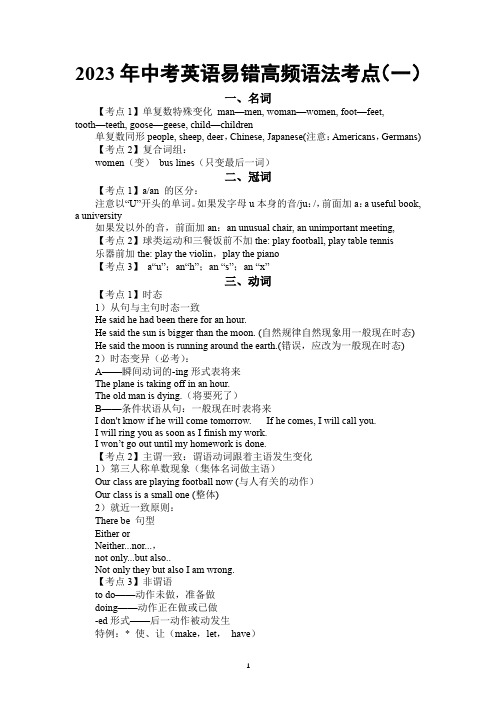
2023年中考英语易错高频语法考点(一)一、名词【考点1】单复数特殊变化man—men, woman—women, foot—feet, tooth—teeth, goose—geese, child—children单复数同形people, sheep, deer,Chinese, Japanese(注意:Americans,Germans)【考点2】复合词组:women(变)bus lines(只变最后一词)二、冠词【考点1】a/an 的区分:注意以“U”开头的单词。
如果发字母u本身的音/ju:/,前面加a:a useful book, a university如果发以外的音,前面加an:an unusual chair, an unimportant meeting,【考点2】球类运动和三餐饭前不加the: play football, play table tennis乐器前加the: play the violin,play the piano【考点3】a“u”;an“h”;an “s”;an “x”三、动词【考点1】时态1)从句与主句时态一致He said he had been there for an hour.He said the sun is bigger than the moon. (自然规律自然现象用一般现在时态)He said the moon is running around the earth.(错误,应改为一般现在时态)2)时态变异(必考):A——瞬间动词的-ing形式表将来The plane is taking off in an hour.The old man is dying.(将要死了)B——条件状语从句:一般现在时表将来I don't know if he will come tomorrow. If he comes, I will call you.I will ring you as soon as I finish my work.I won’t go out until my homework is done.【考点2】主谓一致:谓语动词跟着主语发生变化1)第三人称单数现象(集体名词做主语)Our class are playing football now (与人有关的动作)Our class is a small one (整体)2)就近一致原则:There be 句型Either orNeither...nor...,not only...but also..Not only they but also I am wrong.【考点3】非谓语to do——动作未做,准备做doing——动作正在做或已做-ed形式——后一动作被动发生特例:* 使、让(make,let,have)主动不带to,被动带tomake sb. do /make sb not do/be made to dolet sb. do【出处:】* The teacher asked the students to stop talking and to listen to her.原创作品* I have my car repaired.(我请人修理了我的车。
- 1、下载文档前请自行甄别文档内容的完整性,平台不提供额外的编辑、内容补充、找答案等附加服务。
- 2、"仅部分预览"的文档,不可在线预览部分如存在完整性等问题,可反馈申请退款(可完整预览的文档不适用该条件!)。
- 3、如文档侵犯您的权益,请联系客服反馈,我们会尽快为您处理(人工客服工作时间:9:00-18:30)。
重庆中考英语高频考点中考时态语态复习Review of Tenses一、一般现在时 (Present Simple)概念:表示习惯性,经常性的动作;表示现在的状态与特征;表示普遍真理结构:do does标志语:often,always,usually,sometimes,every day ( week,month, year...)二、一般过去时(Past Simple)概念:表示过去的情况或过去习惯性动作结构:did标志语: yesterday,the day before yesterday,ago,last..., in 1998三、一般将来时(Future Simple)概念:表示将要发生的动作或存在的状态.结构:will do, shall do, be going to do标志语: tomorrow,the day after tomorrow,next...,in + 时间段,in 2020四、现在进行时(Present Progressive)概念:表示正在发生的动作结构:be (is, am, are) + doing标志语: now,置于句首的 Look,Listen五、过去进行时(Past Progressive)概念:表示过去正在进行的动作结构:be (was, were) + doing标志语:at this time,at+时间点+过去时间(at 9:00 o'clock last night),when,while.六、过去将来时(Past Future Simple)概念:表示从过去某时看将要发生的动作结构: would do should do标志语:常用于主句是一般过去时的宾语从句中七、现在完成时(Present Perfect)结构:has + done, have + done概念与标志语:1)表示过去发生的动作影响到现在,与already, yet, ever, never, just, before,so far 连用。
2)表示过去发生的动作持续到现在,常与for+时间段, since+过去时间,提问用How long.八、过去完成时(Past Perfect)概念:过去某时之前已发生的动作结构:had done标志语:1)以by,before+过去时间 2)主句为一般过去时的宾语从句中。
加do:一感feel, 二听,hear ,listen to ,三让let, make ,have, 四看 see,look at ,watch ,notice ,半帮助help注意:1.被动语态+to do 2.see watch +doing 表示正在进行,do 表全过程(做完)加to do:三个希望两答应:hope, wish, want, agree, promise 两个要求莫拒绝:demand, ask, refuse设法学会做决定:manage, learn, decide 不要假装在选择:pretend, chooseplan to do, allow to do, afford to do, would like to do, start,begin……加doing:完成实践值得忙(finish,practice,be worth,be busy) 继续习惯别放弃(keep on,be used to, give up)考虑建议不禁想(consider,suggest,can’thelp,feel like)喜欢思念要介意(enjoy,miss,mind...) 介词后try to do 尽力做…try doing 尝试做forget to do 忘记要做…(没做)forget doing 忘记做了…Remember to do 记住要做…,remember doing 记住做了…状语从句分类及常用连词:用来修饰主句中的动词,副词和形容词的从句叫状语从句。
类别连词时间状语从句when, whenever, while, as, before, after, since, till, once(一旦)(主将从现)地点状语从句where, wherever原因状语从句because, since, as, for, now that(既然,由于)etc. (et cetera,等于and so on)目的状语从句in order that(为了,以便), so that, that, etc.结果状语从句so…that, so that, such…that, that, etc.条件状语从句if, unless, as(so)long as, etc. (主将从现)让步状语从句though, although, even if, even though, however, whatever, as, etc.比较状语从句as…as, so…as, than, etc.方式状语从句as, as if, as though, etc.注意:so that既可引导目的状语从句,又可引导结果状语从句。
区别这两种从句的办法有两个:1)目的状语从句里往往带有情态动词can, could, may, might等。
2)从意思上看,目的状语从句往往表示的目的很明确。
例如:Speak clearly so that they may understand you. (目的状语从句)Jack is badly ill so that he has to rest. (结果状语从句)宾语从句在句中作及物动词的宾语,或介词的宾语,或形容词的宾语。
宾语从句三要点:宾语从句用法速记口诀:宾语从句须注意,几点事项应牢记。
一是关键引导词,不同句子词相异。
陈述句用that;一般疑问句是否(if, whether)替;特殊疑问句更好办,引导词还用疑问词。
二是词态常变化,主句不同从句异。
主句若为现在时,从句时态应看意;主句若为过去词,从句时态向前移。
三是语序要记清,从句永保陈述序。
(主语在前。
谓语在后)定语从句的功用和结构在复合句中,修饰某一名词或代词的从句叫做定语从句。
被定从句修饰的词叫做先行词。
定语从句必须放在先行词之后。
引导定语从句的关联词有关系代词who,whom(人)which(物,)that和关系副词。
例如:I like music that I can dance to.This is the present that he gave me for my birthday.Do you know everybody who came to the party?I still remember the night when I first came to the village?This is the place where Chairman Mao once lived.在非限制性定语从中:The meeting was put off, which was exactly what we wanted.简单句的基本句型:由一个主语(或并列主语)和一个谓语(或并列谓语)所构成的句子叫简单句。
根据句子的基本结构,简单句分为5种基本句型:1.S+V;(主语+不及物动词)Everything changes. 万物都在变。
2.S+V+O;(主语++及物动词+宾语)I like English. 我喜欢英语。
3.S+V+P;(主语+连系动词+表语)She looks young. 她看上去很年轻。
4.S+V+IO+DO;(主语+及物动词+间接宾语+直接宾语)My mother bought me a dictionary yesterday. 我母亲昨天给我买了本字典。
主语谓语间接宾语直接宾语5.S+V+O+Oc;(主语+及物动词+宾语+补语)We must keep our classroom clean and tidy. 我们必须保持教室干净、整洁。
主语谓语宾语宾语补足语简单句五种基本句型巧记歌诀:英语句子万万千,五大句型把线牵。
句型种类看动词,后接成分是关键。
系词之后接表语,不及物后无需连。
及物又可分三类,单宾双宾最常见。
还有宾语补足语,各种搭配记心间。
中考英语作文分为五等:一等文:18-20分;二等文:15-18分;三等文:10-15分;四等文:5-10分。
五等文0-5分。
1、结构:三段式“观点——要点——总结”2、要点:全,围绕中心(翻译)3、逻辑:逻辑词first of all(首先),what's more, (另外),in a word, all in all(总结)4、语法:硬性要求----单词的使用,名称的单复数,主谓一致,时态语态等。
5、亮点:高级点的词汇、词组、句型。
定语从句,感叹句,引用(As the old saying goes)。
1、~ the + ~ est +名词+(that)+主词+ have ever + seen(known/heard/had/read,etc)Mr. Chang is the kindest teacher that I have ever had. 张老师是我曾经遇到最仁慈的教师。
2、Nothing is + ~~~ er than to + V Nothing is + more +形容词+ than to + VNothing is more important than to receive education.没有比接受教育更重要的事3.There is no denying that + S + V……(不可否认的……)There is no denying that the qualities of our living have gone from bad to worse.不可否认的,我们的生活品质已经每况愈下。
4.The reason why +句子~~~ is that +句子(……的原因是……)The reason why we have to grow trees is that they can provide us with fresh air.我们必须种树的原因是它们能供应我们新鲜的空气。
5.The + more + Adj + S + V,~~~ the + more + Adj + S + V ~~~(愈……愈……)The more books we read,the more learned we become.我们书读愈多,我们愈有学问。
6.That is the reason why ~~~(那就是……的原因)Summer is sultry. That is the reason why I don't like it.夏天很热。
